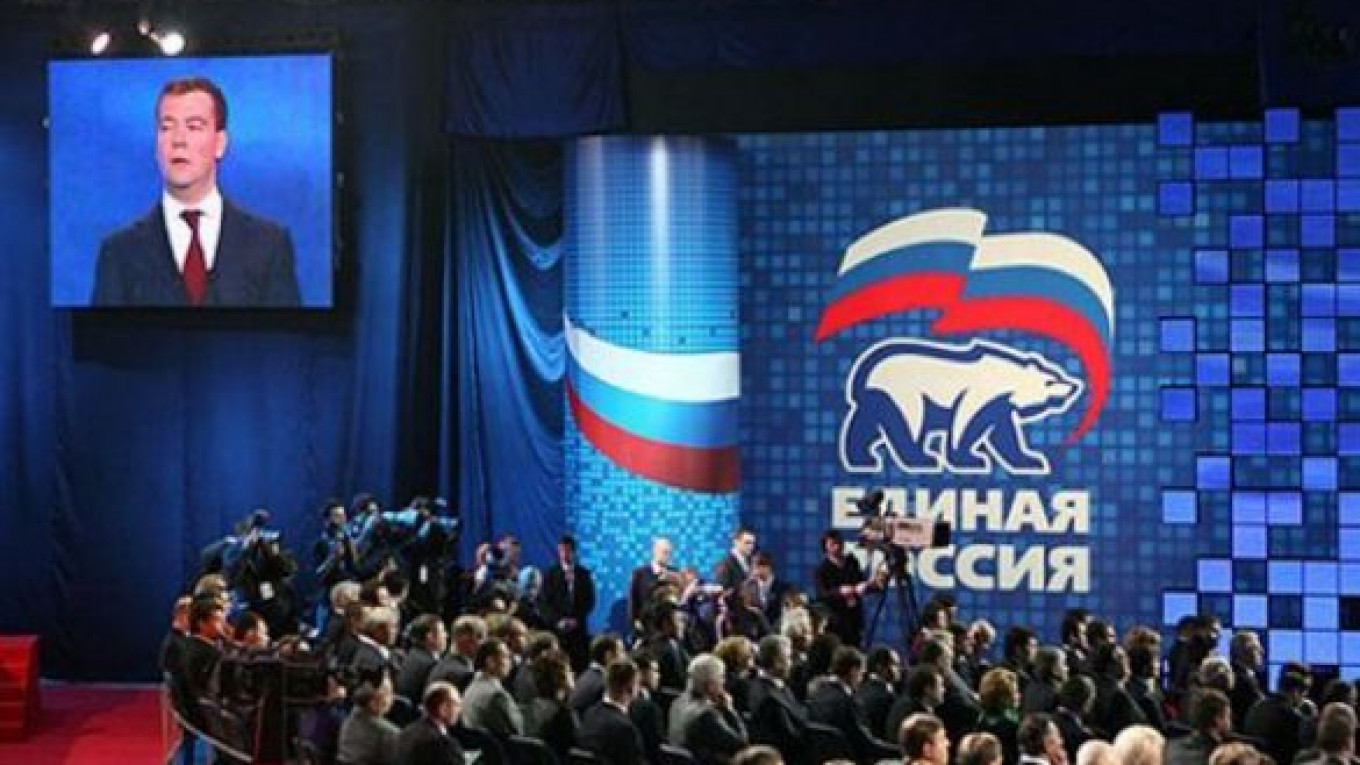The ruling United Russia party has founded a “liberal” platform calling for a major overhaul of the party in light of heightened political competition.
But analysts said that the party, known as a deeply conservative force led by Kremlin loyalists, had no intention of accommodating liberal attitudes and that the manifesto was a ploy to lure new recruits and discredit critics of the ruling regime.
The party published a manifesto late Monday positing that it alone could solve the country’s most pressing social and economic problems, arguing that the state should play a guiding role in the economy and calling on national media to focus on unifying the population.
“In our opinion, United Russia is the only political party capable of realizing the liberal values of freedom, private property, justice, solidarity and sovereignty,” the manifesto reads.
But while paying lip service to competitive elections, United Russia members Vladimir Pligin, Viktor Zubarev and Valery Fadeyev, who co-authored the document, warned that a victory for their opponents “would only lead to violence and lawlessness.”
A whole page of the six-page essay is dedicated to describing “pseudoliberalism,” a term they believe characterizes the country’s liberal parties.
Such parties refuse to accept that there were successes during the Soviet era and ignore the significant achievements of the past 12 years, the manifesto says, referring to the results of President Vladimir Putin’s time in power.
But independent analysts said the manifesto’s overriding aim was to discredit Kremlin critics, and they described its vision for Russia’s future as broadly conservative.
“The manifesto shows that United Russia doesn’t even view moderate liberals as respectable. It was a clear attempt to attack the liberal opposition,” said Alexei Makarkin, deputy director of the Center for Political Technologies.
Makarkin said it was significant that the manifesto’s release coincided with an ongoing investigation into corrupt dealings at the Union of Right Forces, a liberal party headed by Kremlin critics that folded in 2008.
On Tuesday, two senior party figures, former co-leader Boris Nemtsov and presidium member Maria Gaidar, were questioned by investigators in Moscow over the alleged theft of 100 million rubles ($3.3 million) in party funds in a case seen as politically motivated in opposition circles. Two other Union of Right Forces politicians were earlier questioned in the same case.
Makarkin’s comments sharply contrasted with those of Sergei Markov, a Kremlin-connected analyst and vice rector of the Plekhanov Economic University, who told The Moscow Times that the manifesto showed a desire for real reform and explained its apparent attack on rival liberal groups as an effort to differentiate United Russia from its rivals.
By being associated with the liberal opposition, United Russia’s liberals risk suffering a serious political defeat, said Markov, who attended several meetings at which the manifesto was discussed.
But Yevgeny Gontmakher, a prominent sociologist who works in the Modern Development Institute, trashed the idea that the manifesto was anything more than a ploy to swell United Russia’s ranks with new recruits and make a show of intraparty dialogue.
“It’s a deceptive trick, its authors certainly aren’t liberals,” he said, pointing out that Pligin backed legislation classifying foreign-funded NGOs that engage in political activity as “foreign agents” and banning U.S. citizens from adopting Russian children. Both laws have drawn stinging criticism from rights groups and foreign governments.
Fadeyev is the editor-in-chief of the conservative magazine Expert.
Both Makarkin and Gontmakher agreed that the liberal manifesto wouldn’t have any bearing on United Russia’s future, saying that the party would continue to position itself as conservative. United Russia is expected to release social and patriotic manifestos in the near future, and it has for years presented itself as a multi-faction party possessing a wide range of political opinions.
They also said that Prime Minister Dmitry Medvedev, who was installed as United Russia leader in April last year, was unlikely to have played a role in drafting Monday’s manifesto.
“This is likely an initiative of Vyacheslav Volodin [the Kremlin’s point man on domestic politics and a member of United Russia’s Supreme Council],” Gontmakher said. “Medvedev has no power in United Russia, we’ve known that for a long time.”
Vladimir Ryzhkov, leader of the liberal “Republican Party – Party of People’s Freedom,” reacted just as skeptically to the ruling party’s manifesto, saying it was riddled with contradictions and didn’t reflect traditional liberal values.
“It’s politically absurd and will lose the party votes,” said Ryzhkov, who writes a weekly column in The Moscow Times.
“Liberalism is about tolerance and openness, whereas this document is about demonizing the opposition. I’d call it Lubyanka liberalism,” he said.
Contact the author at a.winning@imedia.ru
Related articles:
A Message from The Moscow Times:
Dear readers,
We are facing unprecedented challenges. Russia's Prosecutor General's Office has designated The Moscow Times as an "undesirable" organization, criminalizing our work and putting our staff at risk of prosecution. This follows our earlier unjust labeling as a "foreign agent."
These actions are direct attempts to silence independent journalism in Russia. The authorities claim our work "discredits the decisions of the Russian leadership." We see things differently: we strive to provide accurate, unbiased reporting on Russia.
We, the journalists of The Moscow Times, refuse to be silenced. But to continue our work, we need your help.
Your support, no matter how small, makes a world of difference. If you can, please support us monthly starting from just $2. It's quick to set up, and every contribution makes a significant impact.
By supporting The Moscow Times, you're defending open, independent journalism in the face of repression. Thank you for standing with us.
Remind me later.






